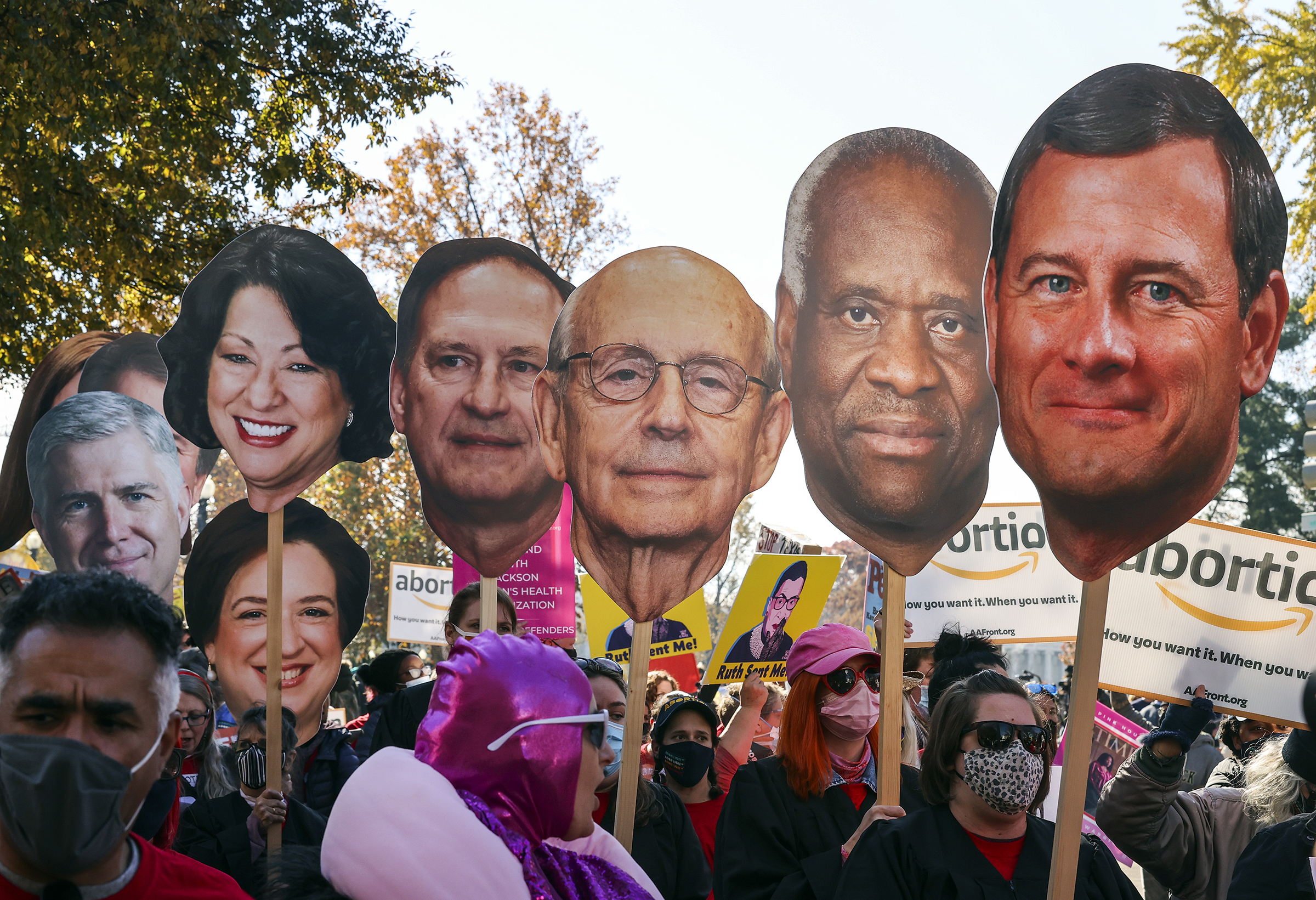
The last 100-plus days of a ban on most abortions after six weeks in Texas have made painfully clear the future anti-abortion extremists want, not just in Texas, but across the country. And now a majority of Supreme Court Justices, having failed to put an end to Texas’s ban, seem poised to let Mississippi’s 15-week abortion ban stand or perhaps even to reverse Roe v. Wade completely. We are headed toward a world in which our zip codes will determine our freedom, our right to control our bodies and our ability to make decisions about our future.
That’s why the line of reasoning we heard from the Mississippi Solicitor General Scott Stewart –– and the line of questioning from Justice Brett Kavanaugh — during oral arguments in Dobbs v. Jackson Women’s Health was so alarming. Abortion opponents are explicitly making a states’ rights argument against the right to access abortion, telling the Court that it is a “compromise” to overrule nearly 50 years of enshrined law, and to leave decisions about our rights up to the states. This is a new bargain for our bodies: the Mississippi Compromise.
Why does this feel so familiar? Because we’ve been here before. When given the opportunity, states have often played with definitions of humanity for political expediency, to bolster their power, or to confer an advantage on a specific group. Historically, they call these power grabs “compromises” — but every time, they’ve been at the expense of freedom. As Justice Sonia Sotomayor made clear, the Texas law “echoes the philosophy of John C. Calhoun, a virulent defender of the slaveholding South who insisted that States had the right to ‘veto’ or ‘nullif[y]’ any federal law with which they disagreed.”
Read More: Inside Mississippi’s Last Abortion Clinic—and the Biggest Fight for Abortion Rights in a Generation
So-called “compromises” about abortion are being made at the same time that Texas and other state lawmakers have implemented some of the most egregious voting restrictions and civil rights violations. They’re systematically stripping people — particularly women, Black, Latino and Indigenous communities, people with low incomes, and the LGBTQ+ community — of their freedoms.
For more than two-thirds of American history, this country has failed to confer full rights on women and people of color. If the Supreme Court empowers states to decide who is free and who is not, then once again, people’s bodies will count toward representation and political power, but their voices — which are calling for freedom, full citizenship, the ballot and bodily autonomy — will be silenced through gerrymandered legislative maps and attacks on voting rights. This has never been about the will of the people. It’s about who controls the levers of power.
And it’s no coincidence that the architects of the most egregious abortion bans are also behind attacks on same-sex marriage, bills that target trans youth, and challenges to COVID-19 vaccine mandates. They’ve set fires everywhere to keep us preoccupied as they systematically dismantle our institutions. In the last decade, we’ve witnessed the decimation of the Voting Rights Act, the rise of disinformation, and an onslaught of abortion restrictions.
Read More: What We Fear in the Wake of the Texas Abortion Law
Anti-abortion policies force people to continue their pregnancy, while the same politicians simultaneously shred the social safety net. Taken together, these attacks will send more people into the trap of debt and poverty, while limiting women’s ability to direct their own lives. At the same time, they’re forcing disenfranchisement, gerrymandering us out of meaningful representation and instituting undemocratic voting restrictions. They intend to strip us of our rights, as part of a broader agenda designed to consolidate power. Because let’s be clear: we can’t vote our way out of this if we can’t vote. We can’t make our voices heard if we can’t freely assemble and protest. We can’t teach our children how we got here if schools are banned from honestly discussing history.
There’s much more at stake than just our right to abortion –– every liberty interest under the Fourteenth Amendment is on the line. If the states can decide if you can have an abortion, it would open the door for states to decide whom you can marry –– or whether contraception is available to you, and what kind. If Roe can be overruled, why not Griswold or Obergefell? There is simply no way to pull one thread without risk of unraveling the entire tapestry.
Read More: Inside The Small Group of Doctors Who Risked Everything to Provide Abortions in Texas
Take nothing for granted: because in a world where politics trump precedent, there are no safe states. That rage you feel? That’s your power. Use it.
The courts may not save us. But our freedom and dignity are not up for debate. There is no compromising on basic human rights.
We will not go back.
More Must-Reads From TIME
- The 100 Most Influential People of 2024
- The Revolution of Yulia Navalnaya
- 6 Compliments That Land Every Time
- What's the Deal With the Bitcoin Halving?
- If You're Dating Right Now , You're Brave: Column
- The AI That Could Heal a Divided Internet
- Fallout Is a Brilliant Model for the Future of Video Game Adaptations
- Want Weekly Recs on What to Watch, Read, and More? Sign Up for Worth Your Time
Contact us at letters@time.com